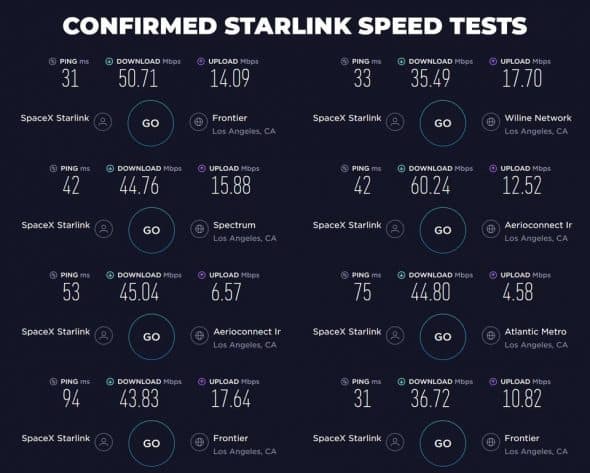 SpaceX’s Starlink service is unlikely to compete in the same arena as fiber and cable internet service providers, if leaked early speed test results are an accurate indication of the service’s performance.
SpaceX’s Starlink service is unlikely to compete in the same arena as fiber and cable internet service providers, if leaked early speed test results are an accurate indication of the service’s performance.
A sub-Reddit for Starlink, the low earth orbiting (LEO) satellite internet service, is buzzing with activity after one or more anonymous users in Washington State shared speed test results in a public forum, in apparent violation of the non-disclosure agreement SpaceX insists alpha testers sign.
Starlink’s current alpha test, open to rural areas in Washington State only, will give SpaceX data on how well the platform performs in the marketplace. As beta tests begin later this year, testers will be required to have an unobstructed view of the northern sky, live within 44 and 52 degrees latitude, be willing and able to complete multiple surveys about the service over a two-month period, and agree to receive and properly install the equipment. All alpha and beta testers will receive the service for free, but will be asked to pay $1 to test Starlink’s billing system.
Testers are supposed to keep information about their Starlink experiences private, as per a detailed non-disclosure agreement that each tester must sign. But anonymous leaks about the service, along with ‘telling’ questions, have frequently appeared in a public forum about the satellite service, frustrating SpaceX. The satellite provider has reportedly issued multiple “takedown requests” to remove violating content.
Last week, Starlink began requesting more detailed information from those seeking to enroll in future beta tests, a sign it is gearing up to test the service more widely soon.

So far, Starlink testers in Washington State willing to leak their experiences are reporting download speeds no better than 60 Mbps, with upload speed averaging between 10-15 Mbps. Latency, a constant problem with satellite internet, was a more impressive 50 ms on average, but can vary between 31-94 ms.
Only a small number of people in Washington State are estimated to be taking part in current trials, which started before SpaceX’s entire satellite fleet is in orbit. SpaceX previously claimed the service was designed to deliver “blazing fast speeds” up to 1,000 Mbps. That clearly is not happening at the moment. Some testers have been told that speed will increase as more satellites are placed into orbit, but others are wondering if early results are good enough, especially considering they are conducted on satellite infrastructure that currently has a light load with almost no users.
Starlink’s speed and performance will be crucial indicators of how the broadband industry will respond to the emerging market of LEO-based satellite internet. If 60/10 Mbps service is what many users can expect to get, that might deflate SpaceX’s boasts that its Starlink platform could be a competitive game-changer. Cable and fiber providers will likely dismiss Starlink as a serious competitor in the urban and suburban markets they serve, noting wired internet performance is already considerably faster. Still, the project could provide much-needed internet service in exurban and rural areas bypassed by cable companies, leaving consumers with a current choice of <10 Mbps DSL from the phone company or no service at all.


 Subscribe
Subscribe
Not a fair assessment, since the satellites are sparsely separated and much further away from the user antenna, than what will eventually be thousands of satellites in orbit, with service coming from one or more, which are direclty overhead. I’m willing to wait.
Putting them in low orbit is a bit of an improvement and I really hope that with more satellites still to be launched hopefully the latency will become less because the way these results came out really is disappointing. My interest in this is huge even though I live in a area with decent internet because I really want this to be successful and for Elon Musk to stick it to the disgusting pig Ajit Paihole because I’ve had it with him. Another thing to consider is with those speed test some of them were from spectrum and frontier and… Read more »
This is still pretty decent service. If it’s cheaper, it could be better. And the system is still in beta, it’s got time to go before it becomes way better. A gig will be possible eventually.
Musk positioned Starlink as a competitor in more rural areas, vs. urban ones. Not sure what everyone reading in that Starlink would compete with terrestrial cable/fiber were thinking. If Starlink can maintain these speeds, with better latency, with a full user load, that’s competitive with LTE, standard wireless ISP, or maybe low-band 5G based home broadband, and comfortably exceeds rural DSL speeds…and is miles better than geosynchronous satellite broadband. Betting that’s enough of a user base to justify their fleet buildout. 8k satellites sounds like a lot until you compare to the tens of thousands of cell sites it takes… Read more »
I hope this works because I would love nothing more then to shut up the pig Ajit Paihole and his BS crap because we need serious internet competition and hopefully it would be enough to end data caps but even then I wouldn’t trust Elon Musk if he says no data caps because I bet he would put caps because he knows this will bring him more money, I think $80 is more then likely the price for starlink service which is insane but paying for gig service from cox, xfinity and spectrum is way worse!!
If you think you’re going to be able to drop your cable service because Starlink provides better download speeds at lower prices, you’ve got another think coming. Even if it did to start with, cable companies would just drop prices a bit and remain the preferred option where you can get them but not fiber (mid-band 5G OTOH will compete with cable on price and somewhat on speed).
Uh what? Launching $10 billion of satellites isn’t for farmers. The PR might sound good there, but the business isn’t, do the math.
If you think cellular or fiber have a urban/rural problem, think again — leo satellite has it much worse, and that’s the reason why it’s done so poorly in the market until now. Most of the earth’s surface is ocean, and much of the land area is uninhabitable. A shocking fraction of the users are dogpiled in very small places. For instance, New York City is practically invisible on a satellite map of New York State. Starlink is based on reusable launch which could get the costs down a lot by orders of magnitude, but the spatial concentration problem is… Read more »
The folks in NYC who want to spite the cable company will have 5G home service available on mid-band or mmWave from T-Mobile before Starlink gets to them. It’ll be $50/mo rather than the $80 rumored for Starlink, so I wouldn’t worry about NYC users filling up the spot beam meant for rural users. Speaking of spot beams, as I recall, CEO spot beams have a 100 mile radius. LEO spot beams are pretty much guaranteed to be smaller. Yes, you’ll still have beams that (as the bird is flying over a given area) cover more populated areas, but if… Read more »
I worry more about DSL users migrating to starlink and clogging the system. Right now DSL is better than GEO Satellite. If all the GEO customers (who have no other option) AND the DSL customers all migrate, I fear that slow speeds and data caps will be the norm and us rural people will be no better off than we are now. Hopefully the system will be built with enough capacity that it can absorb all those customers and provide data and speed needed in todays world and not the 1999 data allotments that GEO provides.
ViaSat’s data caps aren’t _horrible_. They just aren’t great. And the service is expensive. Again, the expense of Starlink is going to be its saving grace capacity wise. Given the option, most folks won’t swap from a 40-50 dollar DSL line to an $80 satellite link. I probably would, for certain performance comparisons, but I’m in the minority. Additionally, if you’re in range for DSL, you’re very likely n range for terrestrial mid-band 5G or fixed LTE, with multiple providers bringing those networks online in the next year or so. We already know that those services will be priced $50-60… Read more »